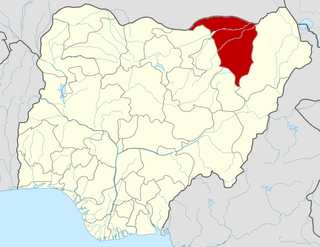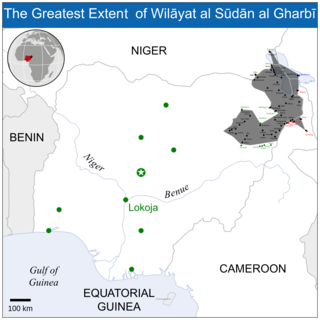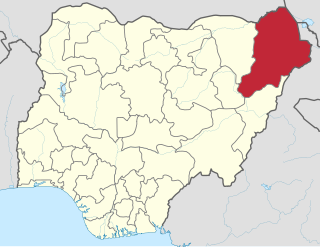Related Research Articles

Maiduguri is the capital and the largest city of Borno State in north-eastern Nigeria, on the continent of Africa. The city sits along the seasonal Ngadda River which disappears into the Firki swamps in the areas around Lake Chad. Maiduguri was founded in 1907 as a military outpost by the British Empire during the colonial period. As of 2022, Maiduguri is estimated to have a population of approximately two million people, in the metropolitan area.

The 2009 Boko Haram uprising was a conflict between Boko Haram, a militant Islamist group, and Nigerian security forces.

Boko Haram, officially known as Jamā'at Ahl as-Sunnah lid-Da'wah wa'l-Jihād, is an Islamist terrorist jihadist organization based in northeastern Nigeria, which is also active in Chad, Niger, northern Cameroon, and Mali. In 2016, the group split, resulting in the emergence of a hostile faction known as the Islamic State's West Africa Province.

Gwoza is a local government area of Borno State, Nigeria. Its headquarters are in the town of Gwoza, a border town "about 135 kilometres South-East of Maiduguri." The postal code of the area is 610.

The Boko Haram insurgency began in July 2009, when the militant Islamist and jihadist rebel group Boko Haram started an armed rebellion against the government of Nigeria. The conflict is taking place within the context of long-standing issues of religious violence between Nigeria's Muslim and Christian communities, and the insurgents' ultimate aim is to establish an Islamic state in the region.
Baga is a town in the northeastern Nigerian state of Borno, close to Lake Chad, and lying northeast of the town of Kukawa. It is located within the Kukawa Local Government Area.
Timeline of the Boko Haram insurgency is the chronology of the Boko Haram insurgency, an ongoing armed conflict between Nigerian Islamist group Boko Haram and the Nigerian government. Boko Haram have carried out many attacks against the military, police and civilians since 2009, mostly in Nigeria. The low-intensity conflict is centred on Borno State. It peaked in the mid-2010s, when Boko Haram extended their insurgency into Cameroon, Chad and Niger.

On February 25, 2014, fifty-nine boys were killed at the Federal Government College of Buni Yadi in Yobe State, Nigeria. The twenty-four buildings of the school were also burned down as a result of the attack. No group has claimed responsibility for the attack, but according to media and local officials the Islamist militants Boko Haram are suspected to be behind the attack.

On the night of 14–15 April 2014, 276 mostly Christian female students aged from 16 to 18 were kidnapped by the Islamic terrorist group called Boko Haram from the Government Girls Secondary School at the town of Chibok in Borno State, Nigeria. Prior to the raid, the school had been closed for four weeks due to deteriorating security conditions, but the girls were in attendance in order to take final exams in physics.
On the night of 5–6 May 2014, Boko Haram militants attacked the twin towns of Gamboru and Ngala in Borno State, northeastern Nigeria. About 310 residents were killed in the 12-hour massacre, and the town was largely destroyed.
The Izghe attack was a terrorist incident that occurred on February 15, 2014.

On the evening of 1 June 2014, an improvised explosive device was set off at a football field in Mubi, Adamawa State, Nigeria. At least 40 people were killed in the attack, according to eyewitnesses. Nineteen others were injured. The perpetrators of the attack were not clear, although media reports generally blamed Boko Haram.
From 20 to 23 June 2014, a series of attacks occurred in Borno State, Nigeria. 91 women and children were kidnapped in the attacks and more than 70 people were killed.
The following lists events from 2014 in Nigeria.
The following lists events that happened during 2015 in Nigeria.
The 2015 Baga massacre was a series of mass killings carried out by the Boko Haram terrorist group in the north-eastern Nigerian town of Baga and its environs, in the state of Borno, between 3 January and 7 January 2015.

Starting in late January 2015, a coalition of West African troops launched an offensive against the Boko Haram insurgents in Nigeria.
The Battle of Kodunga was a military engagement between the Nigerian Armed Forces and Boko Haram insurgents in Konduga, Borno State, northeastern Nigeria, in September 2014.

The Chad Basin campaign of 2018–2020 was a series of battles and offensives in the southern Chad Basin, particularly northeastern Nigeria, which took place amid the ongoing Boko Haram insurgency. The Chad Basin witnessed an upsurge of insurgent activity from early November 2018, as rebels belonging to the Islamic State's West Africa Province (ISWAP) and Boko Haram launched offensives and several raids to regain military strength and seize territory in a renewed attempt to establish an Islamic state in the region. These attacks, especially those by ISWAP, met with considerable success and resulted in the displacement of hundreds of thousands of civilians. The member states of the Multinational Joint Task Force (MJTF), namely Nigeria, Niger, Chad, and Cameroon responded to the increased insurgent activity with counter-offensives. These operations repulsed the rebels in many areas but failed to fully contain the insurgency.

On the evening of 16 June 2019, three suicide bombers detonated their explosives in Konduga village in Borno State, Nigeria, killing 30 people and wounding over 40. The first bomber targeted football fans who were watching a game on television in the hall. He was blocked from entering the hall by the owner. A heated argument ensued, during which the bomber detonated his explosives. This attack was the most deadly suicide bombing in 2019 in Nigeria. Soon after, the other two - both of whom were female - blew themselves up nearby.
References
- 1 2 "Statement on recent murders and abductions in Borno State, Nigeria". United States Diplomatic Mission to Nigeria. February 14, 2014. Archived from the original on March 2, 2014. Retrieved February 26, 2014.
- 1 2 "Konduga Attack: Death Toll Rises to 62, as Military Bombards Possible Boko Haram Hideouts, Articles - THISDAY LIVE". Archived from the original on 2014-03-03.
- ↑ Cook, David (2018-07-01), Kassim, Abdulbasit; Nwankpa, Michael (eds.), "BBC Hausa Service Interview with Muhammad Yusuf", The Boko Haram Reader, Oxford University Press, pp. 71–76, doi:10.1093/oso/9780190908300.003.0010, ISBN 978-0-19-090830-0
- 1 2 "Boko Haram Islamists Massacre Christian Villagers in Borno State, Nigeria". 18 February 2014.
- ↑ "BBC - Homepage". www.bbc.com. Retrieved 2020-05-16.
- ↑ "Over 200 killed in Boko Haram Led Attack in Nigerian Town". IANS. news.biharprabha.com. Retrieved 7 May 2014.
- ↑ Greg Botelho, CNN (14 May 2013). "Nigerian president declares emergency in 3 states during 'rebellion' - CNN.com". CNN.
{{cite web}}:|author=has generic name (help)